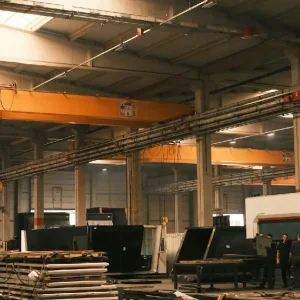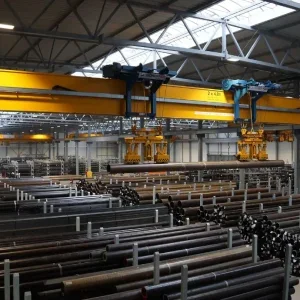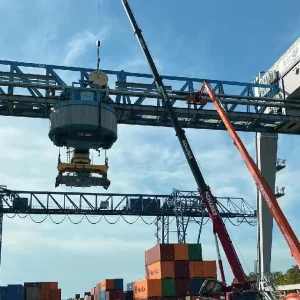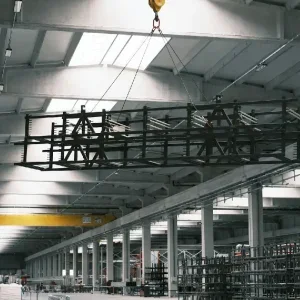For the Middle East’s overhead lifting sector there are many side effects to sustained low oil prices. On one hand some government backed client entities reliant on hydrocarbon export profits are cutting spending on infrastructure and energy related projects. On the other hand the cool down has seen raw material costs bottom out too, making it an excellent time to invest in new cranes and equipment – for those that can still afford to.
This doesn’t just apply to investors. Crane companies also tell Hoist that they are able to use the downturn to invest in their own facilities and systems as well as work more closely with clients to give them the cost effective solutions that they need. "The low oil prices in the region are definitely leading to quite a few projects going slow or being cancelled out right," says Tushar Mehendale, of India’s overhead crane manufacturer ElectroMech. "We look upon this situation from a positive point of view, because during slowdown, the clients also wish to stretch their dollar as much as they can. Hence clients typically will expect to get more for less and hence our customization approach will aid the customer in deriving maximum value for their investment."
Customisation is a key feature here with ElectroMech priding itself on providing bespoke crane solutions to its customers. "We cater to a whole host of different industries in the Middle East – heavy engineering, infrastructure construction, civil construction, general engineering, steel as well as the oil and gas industry. With a wide product range and a presence across a wide spectrum of industries, we have the necessary expertise and experience to cater to a whole range of customer requirements," says Mehendale. "We do not believe that the approach of one medicine for all ailments (that is being followed by standard equipment manufacturers) works in majority of the cases. While some mundane applications can very well do with off the shelf equipment, when it comes to cranes that are at the heart of value addition processes, customisation is the way ahead."
ElectroMech has two companies in the Middle East with its regional headquarters in Jebel Ali, Dubai and it also has sales and service partners in Saudi Arabia, Bahrain, Oman and Qatar. After sales service is provided through subsidiary Cranedge, through which the firm provides maintenance and repair services for not only ElectroMech cranes but for cranes of any other make."On an yearly basis, currently we manufacture in excess of 700 customized cranes at ElectroMech. Thus we are in a position to provide low lead times for our products."
"We have a mixed approach when it comes to executing orders for the ship them in a containerised form to our customers in the region. However, we also have a dedicated fabrication and assembly facility in the UAE where we can fabricate the main structural components like girders and gantry crane legs and then do the final assembly at that factory before dismantling and sending the crane off to the customer."
Mehendale points to several successful projects in the region. "One of the notable project we executed was for Air Liquide’s facility at Ras Al Khaimah where we supplied all the cranes in this huge facility.
We supplied cranes ranging from 5t to 150t in capacity. The 150t cranes were designed with special anti sway systems and are designed to be operated in tandem together to lift a load of 300t." The firm also recently supplied cranes to the oil rig manufacturer Lamprell at their various plants across UAE. "A special rotating trolley magnetic lifting beam equipped crane is used to load and unload large plates for their cutting and panel welding lines.
Other outdoor gantry cranes are used for their fabrication and assembly purposes," says Mehendale. Another busy local company is UAE based Number One Heavy Equipment Services, which also has its own fabrication facility in Umm Al Quwain. Since it was established in 2000 it has provided over 600 EOT cranes across the GCC markets mainly to industrial and warehousing customers.
Crane components are sourced from KCI Konecranes, Stahl and Munkcrane and its long travel power supply systems are sourced from Moblis, Wampfler and AKAAP.
A manager at the company says that the past year 2015 was very busy but the start of 2016 has been quiet for many reasons – including the low oil price. However he says that enquiries have once again begun to rise meaning that he anticipates the market to pick up after the next 3 months.
Low steel prices have enabled the company to drop their own prices he says noting that the market is not too competitive as not many companies are supplying EOT cranes.
One that does however is another UAE based firm ACE Cranes Group which was established in 2002 (see interview). Founder and managing director at the firm Gunasheel Udupi tells Hoist that it too passes low commodity prices on to its customers.
"We buy the steel from job to job, we don’t stock it as a commodity so when we quote the price we take the costing into account," he says. Like other firms the group imports its lifting components from overseas and fabricates its steel locally at its Sharjah based head quarters. The majority of cranes come from Germany’s ABUS but it also installs bespoke solutions from Italy’s Michielotto. During downturns the company has invested heavily in its own facilities and systems as well as delivering a the backlog of work that inevitably accompanied the market peak.
TIGHTER SPECS
One of the less welcome side effects of a downturn is that some clients have scaled back the lifting specifications to the bare minimum. "When I first started out the hoists were lifting for a century.
They would never fail. What I have seen changing is that old hoists were 5,6 or even 7 times over capacity, but today the market has driven manufacturers into calculating things spot on – so that there is no extra cost.
But by taking everything out in my opinion you are more likely to run into problems really soon," says Bart Dieben, a maintenance and field service engineer who manages special overseas lifting projects for major overhead crane companies, through his own business Dieben tt Techical Project Assistance. He has delivered several projects in the region including maintenance hoists for petrochemical plants and complex lifting solutions for theatres and hotels.
"My advice to customers in the Middle East would be don’t look at the budget in short term when buying a crane, look long term. A little more money will last a lot longer and have a lot less down time," he says. "Everyone is trying to go cheaper and cheaper I see quality go down the drain with that. I really advise people to think before they buy, don’t solely look at price."
Working in the region as a field engineer also highlighted Dieben to some of the key issues for equipment. In many cases electromechanical equipment is imported from Europe and local firms then pair these with locally manufactured gantries and structures.
Customers must ensure that their imported parts are adapted appropriately. "If you choose gearboxes and motor installations in Europe they have different temperature settings so you could run into problems if you install them without accounting for the fact that in the Middle East the temperature is double. So you have to look at isolation classes of motor, thicker oils and greases, the electric currents might be different due to resistance in cables and so. There is much more than meets the eye. Also equipment is not always used so frequently or intensely as it is in Europe which can also be a problem. After all ‘if it is resting it is rusting’,"he remarks.






